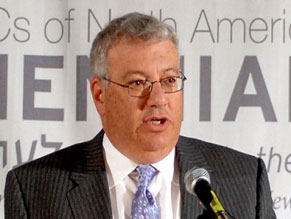|
World Jewish News

Alan Solow (photo by jta.org)
|
'White House has learned lessons'
17.02.2010, Israel and the World The US administration is quietly pressuring the Palestinians to come to the negotiating table, according to an influential American Jewish leader and longtime supporter of US President Barack Obama.
According to Alan Solow, chairman of the American Jewish umbrella organization, Conference of Presidents of Major American Jewish Organizations, the Obama administration has learned some lessons from the mistakes of the past year, primarily “that trying to [pressure the sides] in public is not a recipe for success. One of the weaknesses of the [administration’s] approach toward Israel was that the settlement freeze demand was made publicly, and that put Prime Minister Netanyahu in a very difficult political position.”
Obama’s popularity ratings have suffered among Israelis due to a widespread perception in Israel that Obama favored the Palestinian side in the ongoing Arab-Israeli conflict. But Solow said American leaders are well aware the Palestinians are the party refusing to talk.
“I don’t think the Americans are asking Netanyahu to do more with respect to the Palestinians” than the concessions he has already made, such as the public acceptance of Palestinian statehood and a ten-month construction freeze in West Bank settlements.
“The administration is pressuring the Palestinians,” he insisted, “but [it must do so] quietly, without it appearing as though [Palestinian and Arab leaders] are caving in to American pressure.”
“The administration should continue to acknowledge that the Israelis are willing to return to the negotiating table and it’s time to tell the Palestinians they have to do the same, and it’s important to bring the Arab states into this process to give Abbas the support he needs to start negotiating,” he said.
Solow spoke to The Jerusalem Post on the sidelines of the Conference of Presidents gathering in Jerusalem, an annual event that brings American Jewish leaders to Israel for briefings and meetings in the country. Over the course of the gathering this week, the group of some 100 organizational leaders is hearing from Israel’s president, prime minister, defense minister, opposition leader and other top officials.
While Solow sought to convey that Obama was working behind the scenes to jump-start negotiations, an Israeli official gave a more pessimistic analysis of the current state of the peace process.
“There are question marks in Israel as to whether Abu Mazen [PA President Mahmoud Abbas] wants negotiations at all,” said Israeli special envoy to the negotiations Brig.-Gen. Michael Herzog. In the Israeli view, “Abbas thinks in historical terms. This is his last term as president. He doesn’t want [to start a process that will] fail.”
To convince the Palestinian leaders to come to the negotiating table, the US administration “should make clear to the Palestinians that America will not step forward with an already completed [peace] plan,” a move that would sidestep negotiations and give the Palestinians the impression they need not negotiate over the concessions Israel wants, including recognition of Israel’s Jewishness.
The Arab world, too, “should be encouraged to encourage Abbas to sit down to negotiate without preconditions. [So far], the Arabs have not been willing to say anything publicly on this. Privately, they’re saying to the Americans and to us: ‘We think Abbas’s position regarding re-launching negotiations is unsustainable, but we still support him.’ It’s a contradictory position,” Herzog said.
Indeed, the Arab states could be more a part of the problem than the solution.
“Next month the Arab League is convening. If by then there are no bilateral discussions, the Arab nations will go toward the lowest common denominator [in rejecting negotiations] and tie Abu Mazen’s hands more,” he warned. “So I don’t think we have much time.”
JPost.com
|
|
